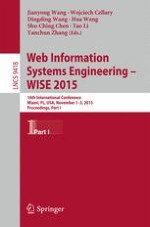2015 | OriginalPaper | Buchkapitel
Twitter Sarcasm Detection Exploiting a Context-Based Model
verfasst von : Zelin Wang, Zhijian Wu, Ruimin Wang, Yafeng Ren
Erschienen in: Web Information Systems Engineering – WISE 2015
Aktivieren Sie unsere intelligente Suche, um passende Fachinhalte oder Patente zu finden.
Wählen Sie Textabschnitte aus um mit Künstlicher Intelligenz passenden Patente zu finden. powered by
Markieren Sie Textabschnitte, um KI-gestützt weitere passende Inhalte zu finden. powered by
